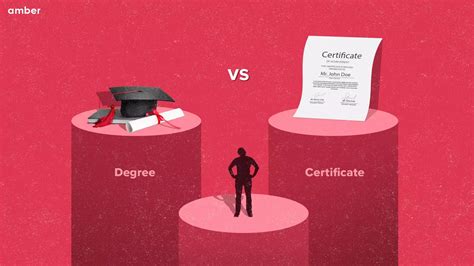In the ever-evolving landscape of higher education, making an informed decision about whether to pursue an associate degree or a certificate is paramount. Both options offer valuable educational pathways, but they differ significantly in scope, duration, and career implications.

Understanding Associate Degrees
Associate degrees are two-year post-secondary programs that provide students with a comprehensive foundation in a specific field. They typically require 60-72 credit hours of coursework, including general education requirements and specialized courses in the chosen field of study.
Benefits of Associate Degrees:
- Career advancement: Associate degrees can qualify you for entry-level positions in a wide range of occupations, such as registered nurse, dental hygienist, or information technology specialist.
- Increased earning potential: According to the Bureau of Labor Statistics, individuals with associate degrees earn significantly more over their lifetimes than those with only a high school diploma.
- Transferability: Associate degrees can often be transferred to four-year universities, allowing you to continue your education and pursue a bachelor’s degree.
Understanding Certificates
Certificates are shorter-term educational programs, typically lasting six to twelve months. They focus on developing specific job skills or knowledge in a particular area. Certificates typically require 18-30 credit hours of coursework and can be completed online or in person.
Benefits of Certificates:
- Rapid skill acquisition: Certificates provide a quick and efficient way to gain specialized skills that are in high demand in the job market.
- Career enhancement: Certificates can enhance your professional reputation and make you more competitive in your field.
- Upskilling: Certificates allow you to stay up-to-date with industry trends and acquire new skills to advance your career.
Key Differences
| Feature | Associate Degree | Certificate |
|---|---|---|
| Duration | Two years | Six to twelve months |
| Credit Hours | 60-72 | 18-30 |
| Scope | Comprehensive foundation in a field | Specific job skills or knowledge |
| Transferability | Can be transferred to four-year universities | Typically not transferable |
| Career Implications | Entry-level positions | Skilled technician or specialist |
Choosing the Right Option
The decision between an associate degree and a certificate depends on your career goals, financial resources, and time constraints. If you seek a comprehensive education that prepares you for a wider range of job opportunities, an associate degree may be the better choice. If you need to quickly acquire specific job skills or enhance your current skills, a certificate may be a better fit.
Common Mistakes to Avoid
- Not understanding the differences: Make sure you fully comprehend the key differences between associate degrees and certificates before making a decision.
- Assuming all associate degrees are the same: Different associate degrees vary in their scope and career implications. Research different programs and choose one that aligns with your career aspirations.
- Pursuing a certificate that’s not in demand: Before enrolling in a certificate program, research the job market and ensure that your chosen area of study is in high demand.
- Overestimating the value of certificates: While certificates can be valuable for acquiring specific skills, they may not be sufficient for securing leadership positions or highly technical roles.
How to Choose
Step 1: Determine your career goals: What occupations interest you, and what level of education is required?
Step 2: Research educational options: Explore both associate degrees and certificates in your field of interest.
Step 3: Consider your time and financial constraints: How much time and money can you invest in your education?
Step 4: Meet with career counselors or industry professionals: Seek advice from experts in your field to gain insights into the best educational pathway.
Step 5: Make an informed decision: Based on your research and consultations, choose the option that best aligns with your career aspirations and personal circumstances.
Why an Associate Degree Matters
Associate degrees matter for several reasons:
- Increased employability: In today’s competitive job market, associate degrees often serve as a minimum qualification for entry-level positions in various fields.
- Higher earning potential: Individuals with associate degrees earn significantly more over their lifetimes than those with only a high school diploma.
- Job security: In many industries, associate degrees provide job security and resilience against economic fluctuations.
- Career advancement opportunities: Associate degrees can open doors to promotions, leadership roles, and further educational opportunities.
Benefits of Certificates
Certificates offer numerous benefits, including:
- Skill acquisition: Certificates provide a targeted and efficient way to acquire specific job skills in a short amount of time.
- Career enhancement: Certificates can enhance your professional reputation and distinguish you from other job candidates.
- Upskilling: Certificates allow you to stay up-to-date with industry trends and acquire new skills to advance your career.
- Increased earning potential: While certificates alone may not lead to significant salary increases, they can improve your earning potential by enabling you to secure higher-paying positions.
Conclusion
Whether you choose an associate degree or a certificate, both options represent valuable pathways to career success. By understanding the key differences, you can make an informed decision that aligns with your goals and aspirations. Remember, the best educational choice is the one that equips you with the knowledge, skills, and confidence to achieve your career dreams.
